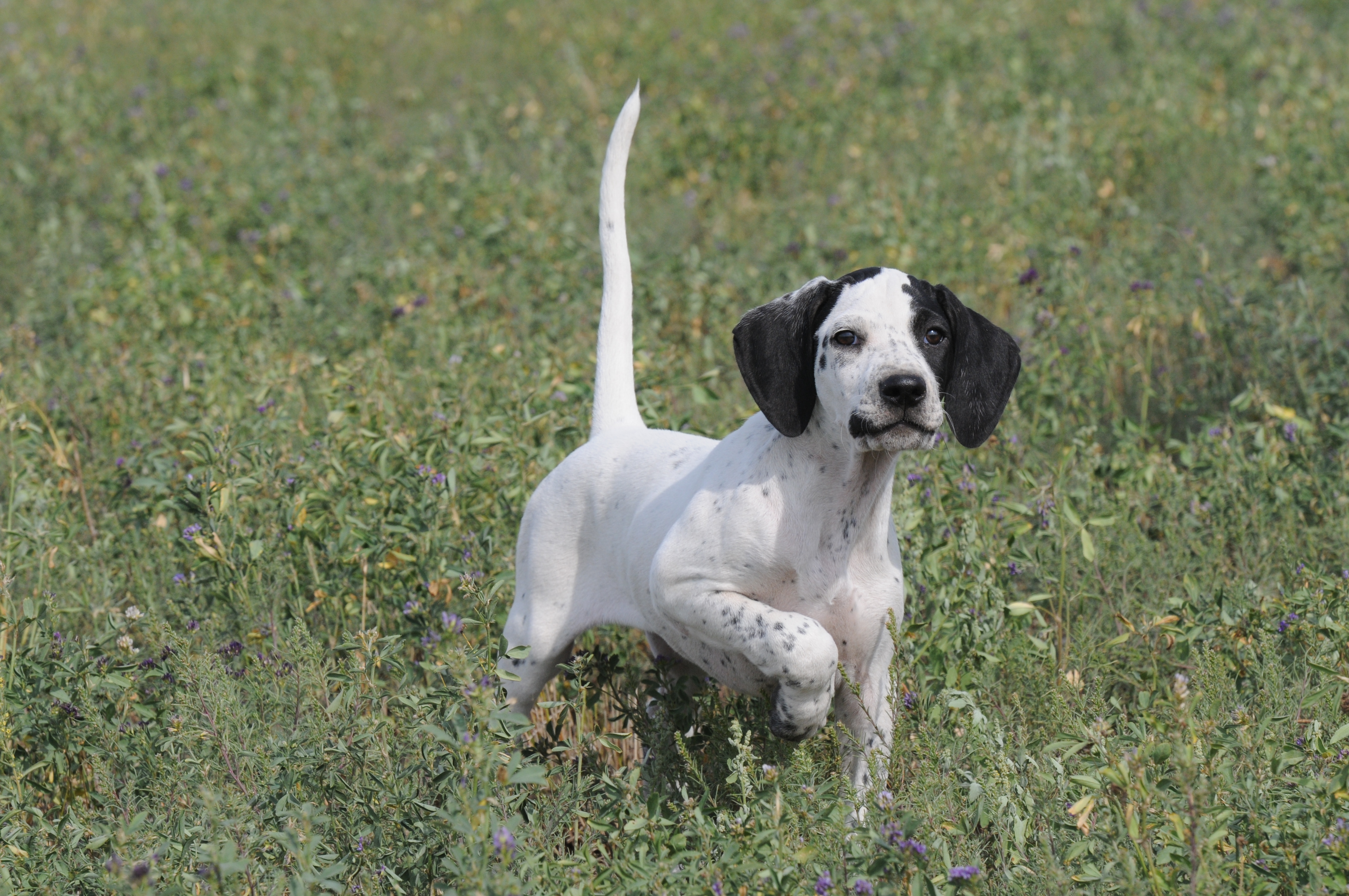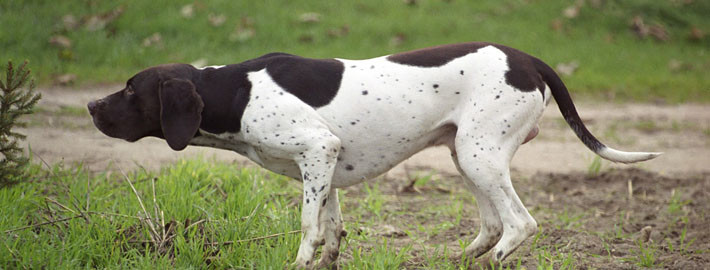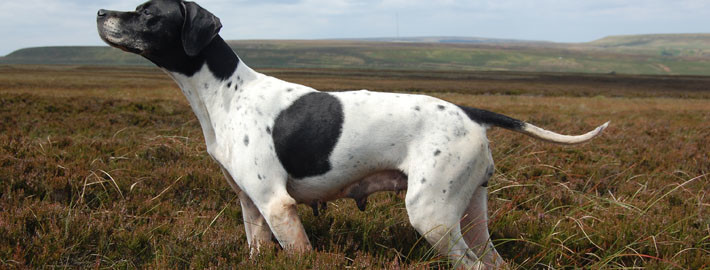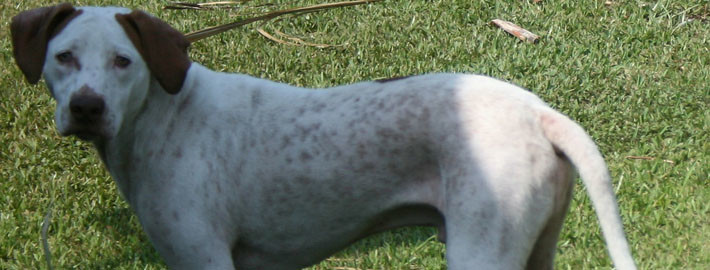What makes the Pointer Unique?
Although these dogs make superb family pets and loyal friends, Pointers nonetheless started off their illustrious career as hunting breed and continue to serve in that capacity to this very day.
Breed Groups
Page Contents

Is the Pointer Right For You?
These dogs are both athletic and graceful. Pointers have sweet dispositions and easy going natures, both traits that make them great companions at home and on the field. These placid creatures nonetheless enjoy their playtime as much as any other dog.
They are wonderful bird dogs, but they are quite distractible if they are not hunting something. Members of this breed can easily run for long periods of time without becoming fatigued and should be kept in a safely enclosed area when they are not being actively supervised.
In 5 Words
- Amiable
- Kind
- Active
- Loyal
- Affectionate
Characteristics
Learn About the Pointer
Description
General Description
Pointers carry themselves in a regal manner. These dogs are both athletic and graceful. They are also predominantly a working breed and this fact should be reflected in their appearance. An alert expression can often be found in their eyes. Members of this breed should additionally possess a compact, slender body and a keen sense of smell. Their noses are typically dark in color. No hound or terrier traits should be present in members of this breed. These dogs are known for their rapid pace and fluid movements. Pointers are capable of moving swiftly while seeking out a particular scent. While on the hunt, their tails will move from side to side. Once their quarry has been spotted, some pointers will hold their tails upright as a signal.
Size
Most female members of this breed range from 23 to 26 inches (58 to 66 centimeters) tall and weigh between 45 and 65 pounds (20 and 30 kilograms). Males generally range from 25 to 28 inches (60 to 70 centimeters) in height and have a weight that averages around 55 to 75 pounds (25 to 34 kilograms). Breed standards generally favor individual Pointers that are proportionate rather than those that fill the aforementioned criteria. However, any deviations from these standards should not prevent the dogs from performing the tasks for which they were bred.
Coat
Pointers are predominantly white with markings in a variety of other hues. Secondary colors include black, orange, lemon, and liver. Solid color dogs in any of the aforementioned shades are also acceptable. While most members of this breed have black or dark brown noses, Pointers with lemon and white colorations also have pale pink noses.
Short History of the Pointer
Records show that Pointers existed in Britain as early as the High Middle Ages. Though their ancestors may have come from Spain or Portugal, these dogs are considered to be an English breed. In fact, the Westminster Kennel Club is thought to have been created in order to improve the overall quality of these dogs. Pointers were originally used for finding rabbits. However, once bird hunting became popular and guns became prevalent in the 18th century, members of this breed were trained to serve a new purpose. They excellent at the sport and did so well that they edged out the competition.
It is uncertain which breeds were used in forming the Pointers. The varied mix is thought to include greyhounds, bloodhounds, fox terriers, bulldogs, and setters. Another possibility is that members of the British army brought back some Spanish pointers after being dispatched to participate in the war there during the 1700s and these dogs eventually crossbred with Italian Pointers to produce the modern variety. This variety was later imported to the United States where the breed achieved official American Kennel Club recognition in 1884.
Temperament
Pointers have sweet dispositions and easy going natures, both traits that make them great companions at home and on the field. These placid creatures nonetheless enjoy their playtime as much as any other dog. In fact, members of this breed may be too rowdy for families with toddlers but otherwise they get along well with everyone. Breed standards state that these dogs should not be timid at all.
Members of the working Pointer lines are considered to be more active and smaller than those dogs from show lineages. They are wonderful bird dogs, but they are quite distractible if they are not hunting something. Members of this breed can easily run for long periods of time without becoming fatigued and should be kept in a safely enclosed area when they are not being actively supervised.
Caring for Your Pointer
General Health
Due to their large chests, bloat is a major breed concern. This condition is caused when gases in a dog’s stomach reach toxic levels. It is a good idea for prospective Pointer owners to research this ailment further and know the symptoms so that they can easily determine when immediate action is necessary. Members of this breed may also run into some problems with pancreatic insufficiencies in their youth but these difficulties can easily be remedied with proper medication. Another minor problem that Pointers suffer from is dwarfism, but puppies born with the condition rarely live long enough for it to become an issue.
Care
Daily
These dogs need a lot of exercise. It is particularly beneficial if they have somewhere that they can play without being on their leashes, such as a fenced-in backyard.
Weekly
English Pointers should have their coat brushed a few times per week. Owners may also want to clean their dog’s teeth several times a week to keep their pets from having bad breath.
Monthly
A monthly application of flea, tick, and heartworm prevention medication is recommended for all dog breeds.
Grooming & Bathing
English Pointers will need a quick rub with a towel or a cloth every so often in order to minimize shedding and keep their coats shiny. Owners should note that the breed does shed moderate amounts of fur on a regular basis, but these dogs only need a bath if they get dirty. Upon exiting the tub, members of this breed should be kept as warm as possible to keep them from getting chilled. A Pointer’s feet and ears will also need to be inspected on a regular basis. It is a good idea to keep their toenails trimmed as well.
Exercise & Training
Pointers are intelligent dogs that like spending time with their human family members. As a result, they are quite easy to train. Members of this breed do best in rural settings because they need a place to run in order to be happy. These dogs are not recommended for people who live in tiny apartments. However, members of this breed can tolerate city life if they are given a sizeable backyard to play in. It goes without saying that improperly exercised Pointers may become destructive.











